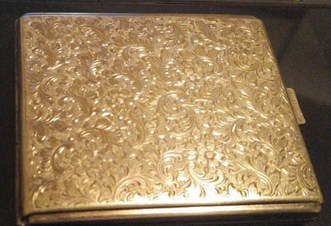Fiction |
The Cigarette Case
|
|
I want to tell you a little of my story. There is no living person in Hungary or anywhere in the world today who remembers me or my family. You see, we all died in 1945 in the concentration camps. Our names are forgotten, erased, as though we never existed. But, there is one person who knows my name. I saw her this morning. She is the American woman who opened a silver cigarette case and slowly read aloud the name “Natalya Kertesz” engraved on the inside.
|
|
|
My country has more than a thousand years of history. We had Kings, Queens, battles, intrigue, and enemies. There were peaceful years of prosperity and years of sordid pain. During the Second World War, Hungary became a member of the Axis Powers. We were betrayed by our leaders. After the invasion, Regent Miklos Horthy signed the armistice agreement with Germany. He was allowed to remain in power, and created a government sympathetic to the Nazis. Soon after that, in 1944, the mass deportations started. Hungarian Jews were sent to Auschwitz, Belsen and other camps. I had just celebrated my 20th birthday and was one of them.
My mother was a Catholic, tracing her lineage to Count István Széchenyi de Sárvár-Felsővidék. He was a progressive politician and writer in 1850, and is still acknowledged by many as "the Greatest Hungarian." Mama fell in love and married my father, a University Professor who was Jewish. In November 1944, the government issued the decree of expulsion for all Jews. The Fascist Arrow Cross groups went on a rampage through the city. Some of our friends disappeared, were killed or thrown into the Danube. Our world of beauty and light dimmed in an instant. We were sent to the Budapest Ghetto and lived there briefly. Two months later, on January 17, 1945, I was transported to Auschwitz where I became ill and died. My parents and brother died in Belsen, and my beloved Zalan in Birkenau. On that same day, Raoul Wallenberg, the man who had brought hope to us, was detained by Stalin’s SMERSH agents. He was never seen again. Just five months before, we had celebrated my birthday at the Symphony, listening to Bartok’s Divertimento for String Orchestra. Zalan, my fiancé, gave me a beautiful silver cigarette case etched with a Persian floral motif. It was a sophisticated gift. My parents did not want me to smoke–but all my friends did. We only had the ersatz cigarettes sold on the black market, tasting of bitter herbs and dried grasses. What I liked were the sensual movements of body and hands when smoking a cigarette. I would slowly open the case, and delicately take a cigarette out. Zalan would lean over to strike a match, cupping the flame with his elegant fingers. We shared cigarettes and he never complained about the imprint of my red lipstick, laughing as I reached to wipe his soft lips. Though the world around us was falling apart, Zalan and I would escape to Lake Balaton for the day, taking a picnic, and swim in the cold waters. That stopped when the Nazis came and we were sent to the Budapest Ghetto. After years of living in a big home on a street lined with linden trees, my family was assigned to one room in the ghetto. Two months later at midnight, the trucks arrived. There was no place to run or hide. That night I was sent to Auschwitz. I dropped my black velvet bag when the soldiers separated me from my family. My cigarette case was in it. I sometimes come back and walk around Market Square in Budapest. It was damaged in the war but has been restored. The smells and sounds are familiar. I still miss that. Today, I see a tall man and a woman at a stall in the outdoor market. He holds her hand and they look at each other lovingly. Are they Americans? She picks up a silver object and shows it to him. My heart beats faster as I look closely at what she is holding. It is my cigarette case that Zalan had given me. I want to cry out loud, but no one can hear our voices or see the tears we shed. The man nodded and said, “We’ll take it—Ayleesh, you are right, you can use it as an evening purse.” The woman smiled, reaching up to kiss him, saying, “Go raibh maith agat.” I suddenly shivered. She was thanking him in Irish Gaelic and I recognized some of the words. We hear many languages as we travel the world. I often spend days at Drumcliff Cemetery in Ireland, sitting at the grave of William Butler Yeats. Zalan would read his poetry out loud. I learned to love the lyrical beauty of his words. I can still hear Zalan reciting the verse, “I will arise and go now, and go to Innisfree . . . And I shall have some peace there, for peace comes dropping slow.” I cry out loudly to the Americans. Please don’t buy my cigarette case. It is mine! No one heard my cries. The Americans left with my cigarette case. I think that perhaps, one day, I will see my love one more time at Drumcliff. But not yet. Postscript:
I wrote this story about an old silver cigarette case that my husband bought for me from a cart outside the Budapest Market. It was a small charming souvenir gift until I opened it. We both love objects with history that we know or learn about. The cigarette case intrigued us because it had a name engraved on the inside. We wanted to know more about Natalya Kertesz. Research would be difficult. Was she Hungarian or was she German? Was she Jewish or Magyar? Was she old or young? We knew it was old because it had accumulated dirt and a dull patina. We stopped at a jeweler’s shop on Raday Street in Budapest and the owner said it was pre-war, perhaps Art Deco? I decided to write with my imagination instead of book research. The one certainty I had was that a woman named Natalya Kertesz existed. I am a romantic at heart and I felt that it was a gift of tenderness and love, and care had been taken to engrave her name inside the case. I became protective of her. I hope the real Natalya would like what I wrote. E. F. |
|
About Elsa Fernandez
click to read Bio
|
Please Comment
click to open a comment box |





